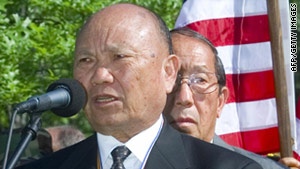Scammer
Banned

-- Twenty-four hours a day, over six days, they're coming by the thousands to remember their hero.
The earthly remains of Maj. Gen. Vang Pao lie in a casket, crossed U.S. and Royal Lao flags nearby.
A spirit guide chants so that the soul of the deceased will go to the spiritual world so that may be reborn.
This week's funeral in Fresno, California, for the charismatic soldier who fought alongside U.S. troops against Communist forces in the mountains of Laos is a pilgrimage for people of many cultures, especially Vang Pao's fellow Hmong, an Asian ethnic group.
Vang Pao's death in January from complications of pneumonia at age 81 was a momentous event for the 210,000 estimated Hmong living in the United States.
"Everyone has a tie to him," Yee Xiong of Seattle told CNN from Fresno on Saturday. "We owe him a debt of gratitude for standing up to the Communists."
In the chaotic days after Saigon fell in 1975 to Communist forces, the United States had to leave Vang Pao and his legion of loyal guerrilla fighters from the Hmong tribe behind.
Vang Pao and other Hmong made their way to Thailand and eventually to resettlement around the world, including in Australia, France, Canada and the United States.
The general settled in California, where he became a community leader and was considered "Father of the Hmong People."
"He was bigger than life," said Gayle Morrison, a Hmong historian living in Santa Ana, California. "If you ever met him, you never forgot him."
This week, the U.S. government is remembering the service of Vang Pao and his graying guerrilla fighters, many dressed in camouflage fatigues, at his traditional funeral in Fresno. The leader lived there his last years.
Xiong, 36, who came as a refugee with his family to the United States in 1980, was in Fresno for three days of the services, which continue through Wednesday.
Friday's events had a particularly patriotic tone.
Vang Pao's casket was taken by horse-drawn carriage to the Fresno Convention Center. A 21-gun salute was fired and U.S. Navy jets flew by, according to CNN Fresno affiliate KFSN. U.S. Marines are serving as honor guards during the event.
The American flag that covered his casket Friday was given to his widow.
Wisconsin-based Hmong Satellite TV is webcasting the funeral live, which will include a Buddhist ceremony and Hmong rituals Sunday. Mourners from across the country, dressed in black, dabbed their eyes as they embraced Vang Pao's relatives Saturday.
The event has not been without controversy.
Relatives were told Vang Pao will not be buried in Arlington National Cemetery, according to Representative Jim Costa, D-California.
Costa, on behalf of the family, asked the U.S. Army to grant an exception to Arlington's rules to allow Vang Pao to be buried in the nation's most hallowed burial ground.
According to the cemetery's policy, Vang Pao would have had to have served in the U.S. armed forces to be eligible for the honor.
"A lot of people are disappointed with the government," said Xiong, who is president of the Hmong Association of Washington.
The family is asking Defense Secretary Robert Gates and President Barack Obama to make an exception. A Pentagon spokesman said he did not know if any request regarding Vang Pao's burial had reached Gates as of Friday afternoon.
The GVP Memorial Central Committee, which has assisted with the funeral, said the CIA recruited Vang Pao in 1961 and the general lost 35,000 troops over 15 years. "General Vang Pao served this country valiantly," it said.
"The military forces has a motto, 'No man is left behind' and General Vang Pao has upheld this motto," the committee said in a statement Saturday urging people to call for a burial waiver for the general. "Now we are asking that all Americans to remember that he did not leave any servicemen behind. Don't leave General Vang Pao behind by not giving him a proper military funeral that all American service men deserve."
The Central Intelligence Agency turned to Vang Pao to lead its clandestine efforts against Communist forces and the North Vietnamese Army. Much of the Ho Chi Minh Trail, a vital supply line for the North Vietnamese and Viet Cong, was in Laotian territory. Laos was officially neutral during the war.
In the end, the Communists prevailed.
"Our general was the only general who did not bow down to the coalition government" that took over, said Xiong, who is married to a Laotian and has returned for visits several times.
In later years, Vang Pao advocated for freedom and democracy in Communist Laos. Morrison said he continued to be an influential figure among his people in Thailand and Laos.
In 2007, the former general and others were arrested for allegedly plotting to help overthrow the Laotian government. The charges were dropped two years later. "I think it was a terrible blow," Morrison said of the case.
The Hmong today are scattered across the United States. Many live in Minnesota, Wisconsin and California.
To this day, Communism is antithetical to the Hmong love of freedom, Xiong said.
"Our culture is about respect and family values," said the electrical engineer, who describes his fellow former refugees as living "in the best place in the world."
Former Hmong soldiers were given places of honor at Friday's services. Other mourners wore Hmong ethnic clothing. Poems were being recited and musicians played bamboo instruments, Xiong told CNN.
Assimilation and time are chipping away at Hmong heritage, but strong cultural ties are still very important, Xiong told CNN.
"Over the last 30 years, the Hmong have managed to retain more of their culture while assimilating" than Vietnamese, Cambodians and people from lowland Laos, Morrison said.
Family, clan and community remain paramount.
"Through unity there can be great success," Morrison said.
